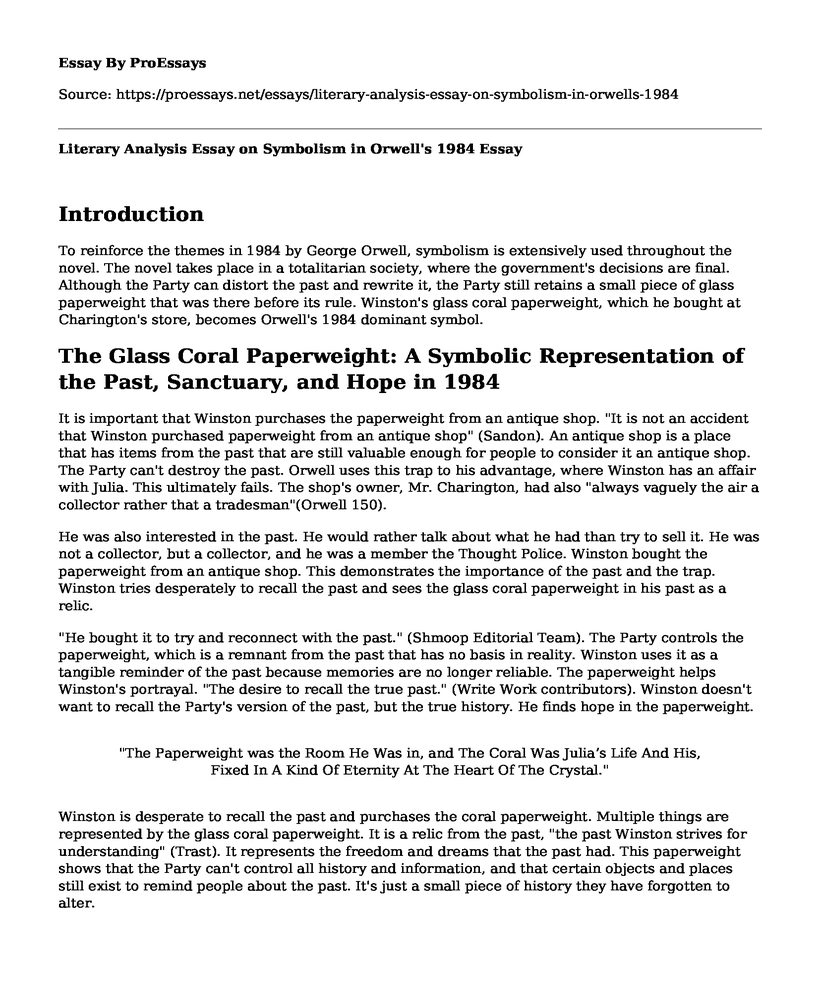Introduction
To reinforce the themes in 1984 by George Orwell, symbolism is extensively used throughout the novel. The novel takes place in a totalitarian society, where the government's decisions are final. Although the Party can distort the past and rewrite it, the Party still retains a small piece of glass paperweight that was there before its rule. Winston's glass coral paperweight, which he bought at Charington's store, becomes Orwell's 1984 dominant symbol.
The Glass Coral Paperweight: A Symbolic Representation of the Past, Sanctuary, and Hope in 1984
It is important that Winston purchases the paperweight from an antique shop. "It is not an accident that Winston purchased paperweight from an antique shop" (Sandon). An antique shop is a place that has items from the past that are still valuable enough for people to consider it an antique shop. The Party can't destroy the past. Orwell uses this trap to his advantage, where Winston has an affair with Julia. This ultimately fails. The shop's owner, Mr. Charington, had also "always vaguely the air a collector rather that a tradesman"(Orwell 150).
He was also interested in the past. He would rather talk about what he had than try to sell it. He was not a collector, but a collector, and he was a member the Thought Police. Winston bought the paperweight from an antique shop. This demonstrates the importance of the past and the trap. Winston tries desperately to recall the past and sees the glass coral paperweight in his past as a relic.
"He bought it to try and reconnect with the past." (Shmoop Editorial Team). The Party controls the paperweight, which is a remnant from the past that has no basis in reality. Winston uses it as a tangible reminder of the past because memories are no longer reliable. The paperweight helps Winston's portrayal. "The desire to recall the true past." (Write Work contributors). Winston doesn't want to recall the Party's version of the past, but the true history. He finds hope in the paperweight.
"The Paperweight was the Room He Was in, and The Coral Was Julia’s Life And His, Fixed In A Kind Of Eternity At The Heart Of The Crystal."
Winston is desperate to recall the past and purchases the coral paperweight. Multiple things are represented by the glass coral paperweight. It is a relic from the past, "the past Winston strives for understanding" (Trast). It represents the freedom and dreams that the past had. This paperweight shows that the Party can't control all history and information, and that certain objects and places still exist to remind people about the past. It's just a small piece of history they have forgotten to alter.
"It's a message from 100 years ago. If one could read it." (Orwell, 183). The sanctuary in Charington's shop is also represented by the paperweight. Orwell wrote that the paperweight was his room, while the coral was Julia and his life, locked in a kind of eternity at its heart. (Orwell 147). It provides a safe haven for Julia and Winston, allowing them to be together without being connected to the rest of the globe. It is where they can be themselves and think clearly. The paperweight, thirdly, is a symbol for hope.
Although the Party attempts to control the past and all information it contains, the paperweight is a symbol of hope for the future. The glass coral paperweight represents the end of love between Winston, Julia. The destruction of Winston or Julia is represented by the shattering of the paperweight. s love"(Write Work contributors). Their relationship will end in a shattered paperweight made from glass. The Thought Police capture Winston, Julia and the glass coral paperweight breaks and Winston betrays Julia.
Conclusion
The coral paperweight represents many important things. George Orwell uses symbolism extensively throughout 1984. The glass coral paperweight represents the past, sanctuary in the room, hope and the destruction Winston and Julia's love in the dystopian society. In a society where the Party controls all information, including the past and the memories of the people, it is the Party that has control. Winston's glass coral paperweight, which he purchases from Charington's shop, is a powerful symbol that further enlarges the purpose of 1984's 1984.
Cite this page
Literary Analysis Essay on Symbolism in Orwell's 1984. (2022, Aug 04). Retrieved from https://proessays.net/essays/literary-analysis-essay-on-symbolism-in-orwells-1984
If you are the original author of this essay and no longer wish to have it published on the ProEssays website, please click below to request its removal:
- Colin Calloway's "New Worlds for All" Essay Example
- Louise Erdrich's "The Red Convertible" Essay Example
- Mythology Comparison and Contrast Essay Example
- Essay Sample on Presumption of Innocence
- Research Paper on Fences by August Wilson
- Biographical Criticism of John Donne Essay Example
- Mary Shelley's Frankenstein: Man-Made Monster and Its Creator - Essay Sample







